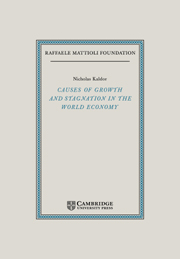Book contents
- Frontmatter
- Contents
- Preface
- Acknowledgements
- CAUSES OF GROWTH AND STAGNATION IN THE WORLD ECONOMY
- FIRST LECTURE Equilibrium Theory and Growth Theory
- SECOND LECTURE Alternative Approaches to Growth Theory
- THIRD LECTURE The Problem of Intersectoral Balance
- FOURTH LECTURE The Effects of Interregional and International Competition
- FIFTH LECTURE Policy Implications of the Current World Situation
- DISCUSSION
- NICHOLAS KALDOR, A BIOGRAPHY, by A. P. Thirlwall
- BIBLIOGRAPHY OF THE WORKS OF NICHOLAS KALDOR, compiled by Ferdinando Targetti
- BIBLIOGRAPHY OF WORKS CITED
- LIST OF ABBREVIATIONS
- INDEX
- Cambridge Cultural Social Studies
SECOND LECTURE - Alternative Approaches to Growth Theory
Published online by Cambridge University Press: 23 December 2009
- Frontmatter
- Contents
- Preface
- Acknowledgements
- CAUSES OF GROWTH AND STAGNATION IN THE WORLD ECONOMY
- FIRST LECTURE Equilibrium Theory and Growth Theory
- SECOND LECTURE Alternative Approaches to Growth Theory
- THIRD LECTURE The Problem of Intersectoral Balance
- FOURTH LECTURE The Effects of Interregional and International Competition
- FIFTH LECTURE Policy Implications of the Current World Situation
- DISCUSSION
- NICHOLAS KALDOR, A BIOGRAPHY, by A. P. Thirlwall
- BIBLIOGRAPHY OF THE WORKS OF NICHOLAS KALDOR, compiled by Ferdinando Targetti
- BIBLIOGRAPHY OF WORKS CITED
- LIST OF ABBREVIATIONS
- INDEX
- Cambridge Cultural Social Studies
Summary
One of the ideas I wished to convey in my first lecture was that the type of economic theory which is the core of the subject as taught in western universities – and that covers North America, Western Europe, Australia, and so on – is pretty useless and indeed harmful for developing an understanding of the laws of motion of capitalist market economies. It is expressed with a phoney kind of precision or “scientism” of a most pretentious kind, using highly sophisticated, mathematical techniques for proving propositions which have no interpretative value of realworld phenomena, for the simple reason that they are based on a priori axioms which have no relation to the conditions which can be empirically observed. All this is aggravated, not helped, by the use of mathematics. Alfred Marshall, who was himself a first-rate mathematician (he was second Senior Wrangler in Cambridge in the year in which Lord Rayleigh, one of the leading English mathematicians of his age, was the first Wrangler), wrote towards the end of his life that he found that “a good mathematical theorem dealing with economic hypotheses was very unlikely to be good economics” because “every economic fact, whether or not it is of such a nature that it can be expressed in numbers, stands in relation as cause and effect to many other facts; and since it never happens that all of them can be expressed in numbers, the application of exact mathematical methods to those that can is nearly always a waste of time, while in the large majority of cases it is particularly misleading, and the world would have been further on its way forward if the work had never been done at all.”
- Type
- Chapter
- Information
- Causes of Growth and Stagnation in the World Economy , pp. 21 - 38Publisher: Cambridge University PressPrint publication year: 1996



